Menu
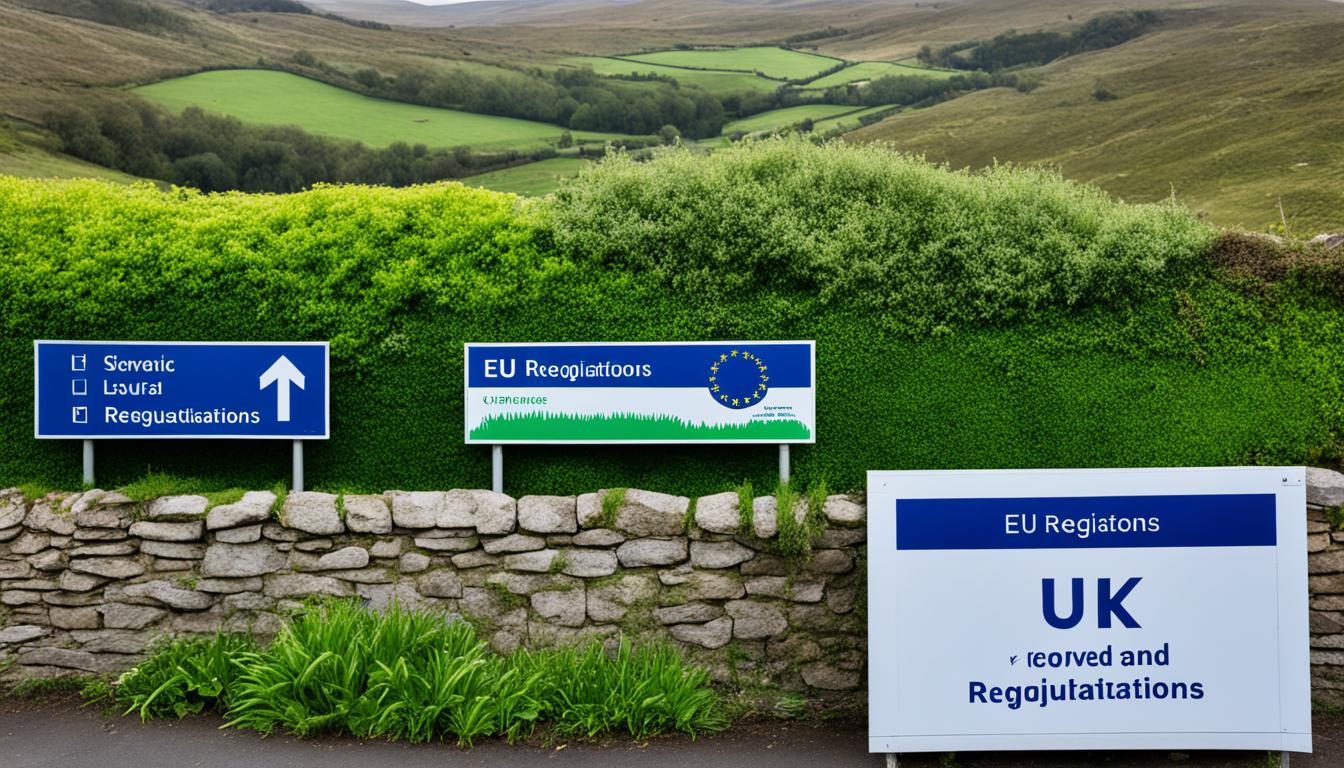
Since Brexit, the UK hasn’t banned any dangerous substances. Yet, the EU introduced eight new rules with 16 more on the table. This shows how Brexit has shaken the UK’s environmental rule book. The country is working hard to set its own environmental laws without the EU.
One big change after Brexit is the UK lost its strong EU support on environmental laws. It no longer gets help from the EU’s scientific advice. This has left the UK with less money and fewer experts to protect the environment.
The UK still lacks a unified plan to protect the environment. There’s no single set of rules for the whole nation. Instead, the UK has started using the Environment Bill. It created the Office for Environmental Protection (OEP) mainly for England. People worry if it can act without political pressure. Now, authorities can change old EU laws and court decisions. This makes the future of the environment rules unclear.
The EU and UK have agreed to keep good environmental goals and aim for zero net carbon emissions. They want to ensure no drop in environmental protection because of trade or investment. But, there are worries. Some changes to how people can use the law might block their right to review environmental decisions.
As the UK leaves the European Union, big changes in how we look after the environment are happening. We are no longer able to tap into the EU’s deep knowledge. This is hard for the UK people who work on protecting our environment.
They now have to come up with new environmental rules and make sure they are followed. All this without the help and checks from the EU.
After Brexit, the UK makes its own environmental decisions. Sadly, most of these only affect England so far because of the way the new rules work. One big issue is that there’s nothing forcing the government to not make the environment worse than it already is. This has slowed down how quickly the UK can make things better for our planet.
Brexit has shaken up how the UK keeps its land, water, and air clean. The UK’s trading of pollution rights and other green practices are now very different from the EU. For example, the Office for Environmental Protection (OEP) works hard to make sure we follow the laws. But without the EU’s smart advice, this job is harder.
The UK and EU agreed to aim for the same green goals, but the UK can change its rules more easily. This could cause problems with trade and stopping the environment from getting worse. It affects a lot of things, like how we manage waste and look after animal and plant life. Also, making new laws without much Parliament checking them has raised worries about fair treatment in environmental court cases.
Although the UK is trying to keep important EU environment rules, it has a lot of freedom to do other things. This shows that we need to watch our leaders closely and make sure they choose the best path for the planet.
After Brexit, chemicals rules in the UK have changed a lot. Now, the UK Reach system is in place, which is more flexible compared to the EU Reach system. This change affects how we keep people and the environment safe as well as trade practices.
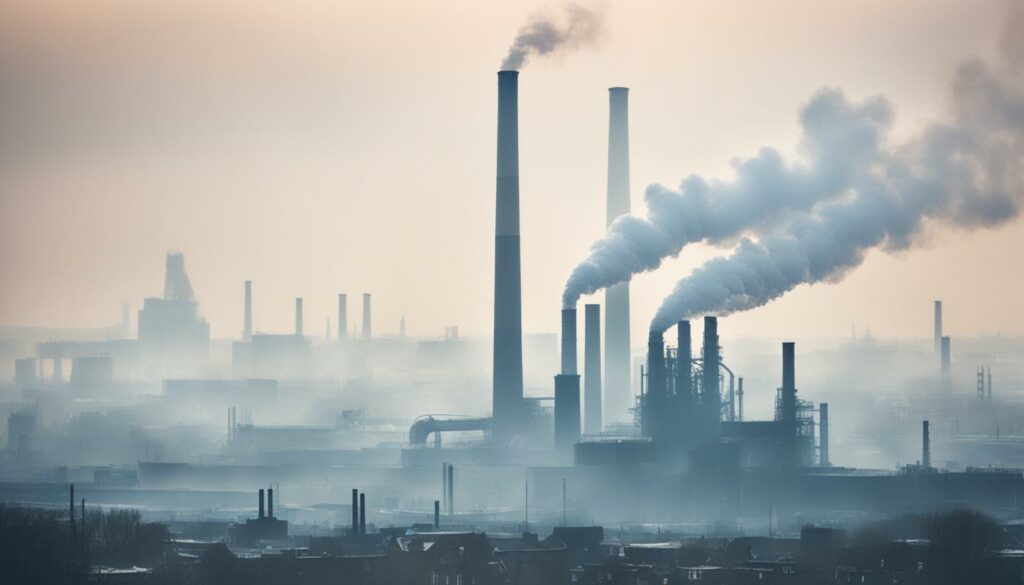
Since 2021, the UK and EU have taken different paths on chemical safety. The EU has made strict rules on eight chemicals, with 16 more on the way. In contrast, the UK has not banned anything yet and is only thinking of restricting two chemicals. Some worry that this could put health and the environment at risk because there are fewer checks and balances on harmful chemicals.
These new chemical safety rules after Brexit can affect trading and safety. The UK now allows chemicals the EU found too risky. This could cause problems for businesses selling to the EU, as they might face restrictions or penalties.
Here’s a summary of the recent rules and bans:
| Region | Regulatory Actions Since 2021 | Substances Banned |
|---|---|---|
| EU | Adopted eight new rules, 16 more in pipeline | Numerous hazardous chemicals, including carcinogens |
| UK | Considering only two new restrictions | None banned; carcinogens still in use |
There are worries about the UK’s ability to safely control chemicals. Some say sticking to the EU’s strict rules would be better. It could prevent dangerous chemicals from getting into our markets and environment.
Experts are also concerned about the UK’s plan to reduce the data chemical companies must provide. This move could mean less oversight, making it easier for us and wildlife to come into contact with harmful chemicals. Keeping chemical laws strong post-Brexit is crucial for everyone’s health and keeping the UK’s rules trustworthy.
Since Brexit, the UK has started setting its own pesticide rules. This is different from the EU. The change shows how the UK’s approach to the environment has shifted after Brexit.
The UK now uses 36 harmful pesticides that the EU bans. Since Brexit, the EU has blocked 30 of these chemicals. UK regulators have also said yes to six new pesticides, which the EU has not agreed to. This shows the big changes in pesticide rules after Brexit.
The UK’s new rules mean it can keep using dangerous chemicals. One of these, thiamethoxam, can hurt bees. Using these chemicals can mess up the natural balance by killing important bugs.
| Aspect | UK Post-Brexit | EU Regulations |
|---|---|---|
| Number of Hazardous Chemicals Banned | 0 | 8 (with 16 more proposed) |
| Harmful Pesticides Allowed | 36 | 0 |
| Newly Approved Pesticides | 6 | 0 |
Allowing these harmful pesticides to be used more shows how the UK and EU are different now. This could be bad for people’s health and the UK’s reputation on the world stage. It’s very important to keep an eye on these pesticide rule changes to protect our health and environment.
In the time after Brexit, the UK is changing its environmental rules a lot from the EU’s. The EU’s rule, a carbon border adjustment, means putting tariffs on high-CO2 goods. This is to make people think twice about buying them and lower carbon emissions worldwide. However, the UK’s plan is seen as not strict enough. The UK won’t start its own tariffs on these products until at least 2027.
This has made some worry about how the UK will control carbon emissions. It might allow high-carbon goods in without taxing them for longer. This could weaken the global push to reduce carbon dioxide in the atmosphere. According to The Guardian, many are questioning how effective the UK’s standards will be.
The EU is leading the way in fighting climate change with its carbon border adjustment. This is a plan to put tariffs on goods based on their carbon footprint. The aim is to get global producers to cut their emissions. Sadly, the UK isn’t up to this level yet.
It won’t start using similar tariffs until 2027. This delay might mean the UK will bring in goods with more carbon. This could go against the work to lower carbon emissions worldwide. The Guardian says this delay raises doubts about the UK’s real commitment to fight climate change.
As Brexit shapes the UK’s environmental stand, its carbon pricing future is unclear. The EU is making big moves to cut emissions, while the UK seems less strict. This has people worried about the UK’s future carbon emission rules.
The UK delaying the carbon border adjustment until 2027 also leaves room for doubt. Some question if the UK is committed to its climate promises and its trade partners. We must watch how the UK follows global environmental goals closely.
| Aspect | EU | UK |
|---|---|---|
| Implementation Year | 2026 | 2027 (earliest) |
| Tariff on High-CO2 Products | Yes | Proposed |
| Stringency Level | High | Moderate |
Brexit has brought big changes to the UK’s environmental rules, especially on deforestation policy. The UK is making its own laws as it plans for a General Election. This creates a gap between the UK’s environmental rules and those of the EU.
In the UK, the Environment Act puts a focus on certain goods. Companies that use these goods must make over £50 million a year to comply. But, if a business uses less than 500 tons a year, it can ask for an exception. The list of these goods includes palm oil, cocoa, beef, and soy. Companies that break these rules face fines or even bigger penalties.
On the other hand, the EU wants imports to be free from deforestation by certain dates, depending on the size of the business. Companies that don’t meet these rules in the EU could be fined a big percentage of their earnings. They might also have their products taken away or be forbidden from selling to the government for up to a year. This strict EU rule applies to items like cattle, cocoa, and wood.
The difference between the UK and EU laws could have a big impact worldwide. The UK focusing on stopping illegal deforestation might make some countries change their laws. This could make it easier for the UK to import goods that harm the environment. Environmental groups are worried about this.
Also, that the UK isn’t including items like coffee in its rules is worrying. The EU is moving very fast to make its environmental rules stronger before elections. This could put UK businesses at a disadvantage, making them pay more or face challenges trading with the EU.

Getting ready for these new rules, companies should check the risks, use technology like satellite images, and set up strong checking processes. Knowing exactly where their supplies come from is very important. They also need to keep up with the latest UK and EU rules. The situation might get better after Brexit, but for now, the different rules are a big problem for UK companies.
In the UK, we don’t have a similar fund like the EU’s Social Climate Fund. This has sparked many talks about what will happen to the UK environment legislation after Brexit. The EU’s fund helps poor families switch to greener ways of living. It takes care of things like adding insulation to homes or helping buy green cars. Without such help in the UK, there are worries. We might not be ready to push for eco-friendly options quickly.
The UK’s path could mean we take it slow to adopt greener technology. The EU’s Social Climate Fund plays a big role in their green plans. It helps make sure everyone can keep up with new green rules. But in the UK, we might not be able to change fast enough. This could really slow down our social climate policy UK post-Brexit.
To see why things are different, we need to look at the big gaps between the EU and the UK. They have big plans to go green. But, the UK’s moves aren’t as strong. They need to up their game.
| Factor | EU | UK |
|---|---|---|
| Social Climate Fund | Available | Absent |
| Home Insulation Support | Financial aid for upgrades | Limited programmes |
| Sustainable Transport Initiatives | Comprehensive funding | Fragmented assistance |
As we head into the Brexit world, the UK really needs to step up. We need strong policies like the EU. Our environment legislation after Brexit needs to look after everyone. It should help them use and get used to green stuff. This way, we can keep up with the EU on making life better for people and the planet.
After leaving the EU, the UK looked at its rules in many areas. One big change came in how we deal with genetic change. Now, we aim to use genetic tech to make plants and animals better, to help farming make more money. But this shift from the EU’s tight rules to our push for new ideas and growth raises worries. People are concerned about how much genetic change is okay and what it might do to animals and the environment.
The UK passed the Genetic Technology (Precision Breeding) Act as part of this change. This act is a major move away from EU rules. It encourages using genetic science to better crops and animals. The EU has always been careful about these new genetic types (GMOs). But now, the UK wants to lead in finding new ways to grow. Our focus is on getting ahead in the world and making more money. Still, not everyone is sure if this is completely safe for animals and nature.
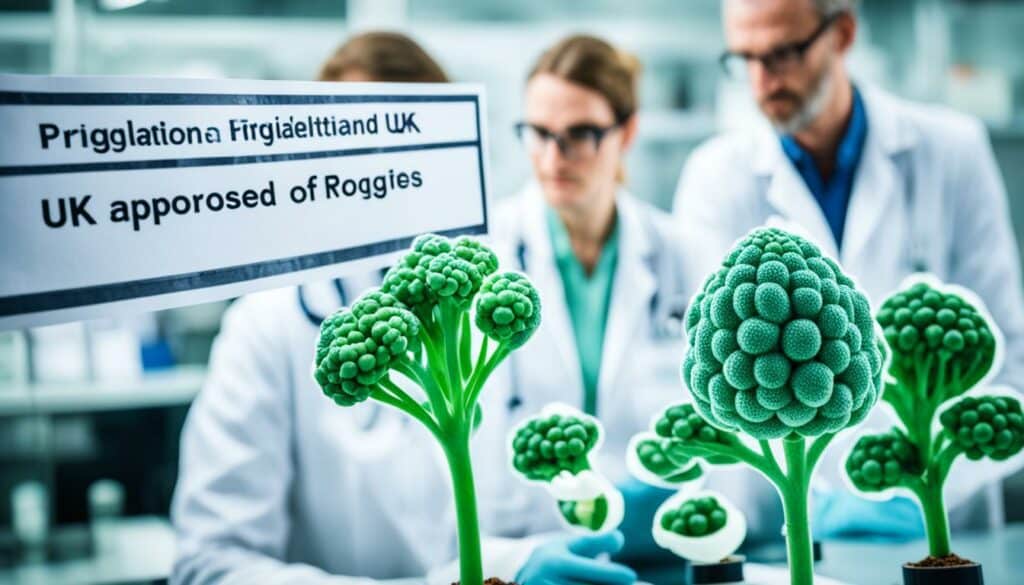
Leaving the EU and changing genetic rules could really affect farming and trade. By improving how we grow things and when they ripen, we could make a lot more money. But these different rules from the EU might make trade harder.
| EU Practices | UK Practices |
|---|---|
| Stringent GMO restrictions | Relaxed regulations under the Genetic Technology (Precision Breeding) Act |
| Strong emphasis on ecological and animal welfare | Focus on economic and innovation-driven growth |
The Genetic Technology (Precision Breeding) Act shows a bigger pattern since Brexit. It pushes farming to be better and smarter. But, we also need to think about the effects on nature and trade in the long run.
The UK is making changes after leaving the EU, some say relaxing air pollution rules. This could affect public health and the environment. People want to keep the high standards for clean air they’ve known.
The UK is taking a different path from the EU. It plans to change air-quality rules but the EU keeps making theirs tougher. For instance, the UK hasn’t joined the EU in banning some harmful chemicals.
The UK could see more pollution if the rules are made looser. This might lead to more breathing problems and other health issues. The EU is going the opposite way, aiming to protect its citizens better.
The UK and the EU are clearly going in different directions. The EU is getting stricter on health and environment rules. Meanwhile, the UK seems set on easing up. The UK even plans to delay a carbon tax until 2027. This puts more pressure on the UK to control air pollution without EU help.
In summary, the UK’s new air pollution rules after Brexit could seriously impact public health. It’s up for debate how well the environment will be protected. Maybe the UK needs to think carefully and make stronger policies to keep people safe.
After Brexit, the UK has changed its approach to battery recycling. It is now different from the EU’s strict methods. Environmental rules in the UK are less tough compared to the EU’s. This includes not having some eco-focused plans like a digital passport. The difference matters a lot for our planet’s health.
The EU is making quick progress with laws, adding eight rules on dangerous chemicals since Brexit. There are plans for 16 more. Yet, the UK has not made any new bans in this area. Even though they’re thinking about stopping lead bullets and dodgy stuff in tattoo ink, these rules are not in place yet.
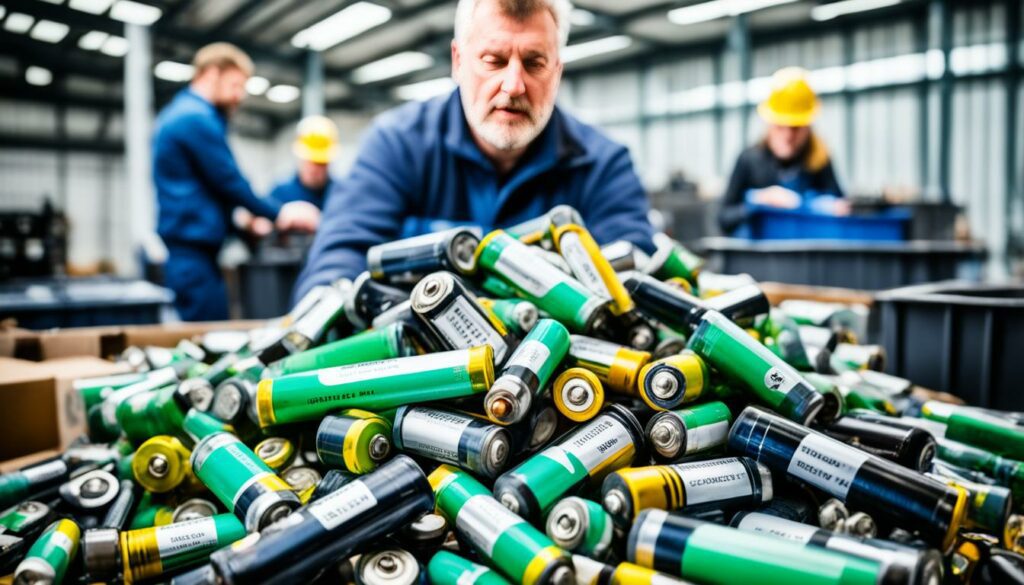
Moreover, the EU is quite serious about making sure batteries are recycled properly. They have set standards for this and want a certain level of recycled stuff in new batteries. But the UK is still just talking about what to do. This means the level of eco-friendliness between the two places is growing apart.
To show the differences clearly, a table helps:
| Aspect | EU Regulation | UK Regulation (Post-Brexit) |
|---|---|---|
| Hazardous Chemical Bans since Brexit | Eight adopted, 16 in pipeline | None adopted, few under consideration |
| High-CO2 Product Tariff | 2026 implementation | Not before 2027 |
| Battery Recycling Focus | Digital passport, due diligence, waste collection targets, minimum content levels | In consultation phase |
| Deforestation Legislation | Includes illegal and legal deforestation across various products | Focuses only on illegal deforestation, excludes key items like coffee |
| Support for Green Transition | Social climate fund for vulnerable groups | No equivalent initiative |
This table plainly shows the big difference between the UK and EU rules. The impact goes further than just how we recycle batteries. It influences trading, health, and efforts to take care of our planet. It’s crucial for the UK to start making big changes to match the global environmental standards post-Brexit.
The UK might cut back EU rules that keep our waters clean. This change could make our rivers and seas dirtier. It’s a big difference in EU and UK environmental law that might lower water quality. This might harm wildlife and could hurt people too.
After Brexit, rules on harmful chemicals are changing. The EU set up eight bans, but the UK only thought about two. Without the EU’s strict rules, the UK may allow more pollution in its waters.
Many English rivers don’t meet nature’s quality checks. Surveys show their chemical health is bad too. We might see even worse numbers if the UK relaxes its clean water rules. This could hurt plants, animals, and people who enjoy these places.
Not many water bodies were checked in 2022 because of the pandemic. Those that were tested showed worse results. Sadly, there won’t be a full update on the water’s state until 2025. The government says it’s working to make things better, but we need to see real changes happening to believe them.
The new way of checking water health, Natural Capital and Ecosystem Assessment (NCEA), is getting mixed reviews. Some worry it could make comparisons with other countries harder. This could mean the public might not fully understand the water reports they see.
The Trade and Business Commission and important figures like Paul Blomfield MP from the Liberal Democrats warn against moving too far from EU standards. They say staying close to the EU will protect our jobs and nature. To fight pollution, they believe the nation needs stricter laws.
The UK’s path on water quality rules is being watched closely. How we manage our water has big effects on the environment and our lives. Keeping our waters clean directly impacts our health, nature, and economy.
Brexit is causing big changes in how the UK handles agricultural emissions and food safety. The UK is moving away from strict EU rules, now needing to find a way to keep the environment safe and grow its industry. It’s also looking at how to be a strong competitor in global trade.
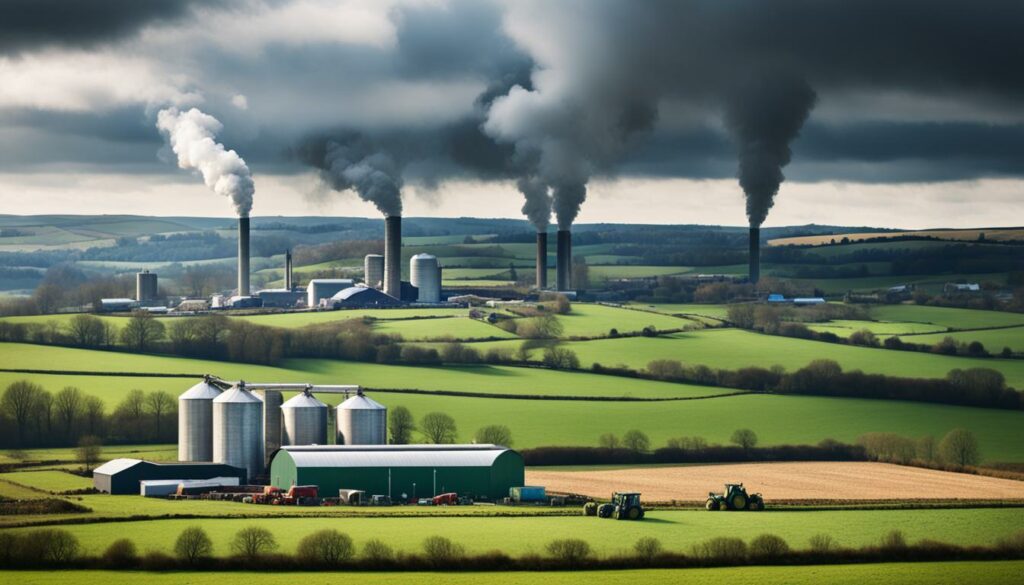
Thinking about laws for agriculture emissions in the UK is now more important than ever. There’s a key issue with the lack of talk on environmental rules in the UK’s new trading policies, especially for food trade. Right now, there’s no set list of rules for this part of trading. This grey area makes it hard to hold to high standards at home while also doing deals with countries like Australia and the USA, which export a lot.
In the EU, there’s a push to update the rules on industrial emissions to include farming practices. But for the UK, it’s not easy to match up its green goals with its trade hopes. The challenge is clear: aiming for no net carbon emissions by 2050 while considering deals with countries with lower green standards.
Even though the farming sector has cut emissions by 12% from 1990 to 2021, its piece of the UK’s total emissions is growing. Now, it’s more than 11%. The Climate Change Committee believes this can go up to 20% by 2035. These stats show the need for strong policies that protect the environment without hurting trade.
The effect of these new rules on farming, especially the intense kind, is huge. Not having clear laws on emissions might increase pollution. It could also affect food safety after Brexit. The CCC wants to see a big cut in emissions from farming – up to 28% less by 2035 and 36% less by 2050. This goal highlights the need for strict laws that support farming that’s good for the earth and safe for us.
Post-Brexit, a main policy change is the Environmental Land Management scheme. It aims to encourage farming that’s good for the environment. But for this to work, it must go hand in hand with tough emissions laws and smart trade policies.
| Performance Indicators | UK Targets | Current Status | Future Projections |
|---|---|---|---|
| Agricultural Emissions Reduction | 28% by 2035 | Static in last decade | 36% by 2050 |
| Share of Emissions | 10% in 2030 | 11% | 20% by 2035 |
| Land Reforestation | 25% by 2050 | 15% | Improved land management |
In short, dealing with agriculture emissions laws and keeping food safe in the UK are top priorities. It’s critical to balance local emission goals with global trade. This requires smart and inventive policies that protect the gains we’ve made so far.
The UK and the EU are heading in different directions on waste and recycling. The EU is making its laws tougher, especially on fast fashion and food waste, through the waste framework directive. On the other hand, the UK might see more trash because its rules will be less strict.
Textile waste, mostly from fast fashion, is becoming a big problem. The EU wants to make rules stricter but the UK is not following in their footsteps yet. This could lead to even more textile waste in the UK, making the environment suffer.
The UK could find it hard to deal with this waste. This might mean more materials that can’t be recycled end up in the ground.
Reducing food waste is a big issue that everyone needs to address. The EU is preparing to bring in strict rules to cut down on food waste. This move is set to have a big positive effect on the environment.
After Brexit, the UK’s rules on food waste will be less strict. This could mean more food waste in the UK. The EU is pushing for strict rules in all waste areas. The UK needs to keep up to stay focused on green, sustainable waste management.
The gap between EU and UK environmental rules is widening after Brexit. The EU is working on big plans to manage waste, especially textiles and food. The UK seems to be more relaxed about its approach, which could make handling waste harder.
The UK’s decision to leave the European Union has changed its approach to the environment. The country has made new goals, such as improving the environment in 25 years. It also aims to have no net greenhouse gas emissions by 2050. This shows the UK’s long-term plans for the environment.
The UK has introduced the Environment Bill and set up the Office for Environmental Protection. Both are big steps in making sure the UK keeps up with environmental laws. The Office for Environmental Protection will help make sure these rules are followed. However, not including a rule to stop environmental protections getting weaker is worrying.
Looking at Brexit’s impact, we must think about global promises and trading. Before Brexit, many UK environmental laws were from the EU. Now, the UK must make its own decisions without the EU. This change will affect how businesses follow the rules. It will also test the UK’s environmental goals and how well it works with other countries on environmental issues.
My main concern is keeping the UK’s environment strong. I believe strong rules will help the UK have a future that is both sustainable and secure.
Since leaving the EU, the UK has changed its environmental rules big time. It’s making its own policies now. These are different from the strict EU laws we had before.
News from “The Guardian” tells us environmental protection in the UK may weaken post-Brexit. Areas like chemical safety and deforestation might see less care. This shift could be risky for our health and the planet.
After Brexit, the UK brought in UK Reach to replace the EU’s rules. UK Reach is more relaxed, allowing dangerous chemicals the EU banned. This affects health and how we trade with the EU.
Post-Brexit, the UK still lets in 36 pesticides the EU said no to. This could be bad for the environment and our health. For example, a pesticide dangerous to bees is still okay here.
The UK’s approach to goods with lots of CO2 is seen as weaker than the EU’s. Critics say it’s too easy. The UK won’t fully act on this until at least 2027.
The UK’s deforestation law only covers products from illegal cutting, unlike the EU which demands a broader cleanup. This might make some places think they can cut down more, making global deforestation worse.
Right now, the UK doesn’t have something like the EU’s Social Climate Fund. This fund in the EU helps less well-off people move to greener ways. So, UK folks might miss out on green option help.
The UK’s law on genetic technology is not as tight as the EU’s. The UK focuses more on making farming profitable. But, this could mean changes that harm animals and hit our trade with the EU.
The UK might ease its rules on air quality, says the Retained EU Law Act. This could mean more pollution than the EU wants, which is bad for our health.
Yes, the UK has looser battery recycling rules than the EU. The EU wants stricter rules, like special digital checks. The UK is still deciding its rules.
The UK might drop some water quality goals from the EU. This could mean more pollution in the UK’s waters than the EU allows.
Without the EU’s Industrial Emissions Directive, UK farms might pollute more. This could be worse for the environment than in the EU.
After Brexit, the UK aims to do its own thing on waste. This could mean more waste, especially from fast fashion and food. The way we get rid of waste might not be as tough as the EU’s.